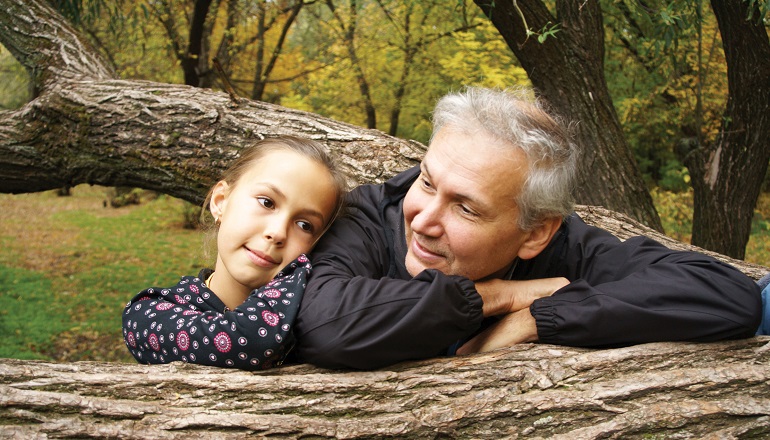Children ask questions to figure out the world. If a child’s family was formed by adoption, much of her curiosity will center on birth mothers, babies, and the reasons adoption plans are made. We’ve compiled 20 of the most frequently asked questions, from the preschooler’s, “Did I grow in your tummy?” to the more complex queries preteens and teens may voice, along with sound responses suggested by experts and other parents over the years. As you talk to your child, adapt the sample language to fit your family’s circumstances. Let the Q&A session begin!
1. “Did I grow in your tummy?”
“No, you didn’t grow in my tummy. You grew in your birth mother’s tummy, and then you were born. When your birth mother and birth father were expecting you, they knew that they couldn’t take care of any baby at that time. Your birth mother found us, and we became your parents. I’m so happy that we are! That is called adoption.”
Although very young children can’t yet understand reproduction, it’s important to introduce the birth father from your earliest conversations. Your child also needs to understand that she was born, just like any other baby. Some parents skip that step, saying, “No, you didn’t grow in my tummy. We adopted you!” This leads the child to believe “I wasn’t born, I was adopted.”
2. “Why didn’t my birth parents keep me?”
“Sometimes when a man and a woman have a baby, they cannot take care of any child at that time. It’s never because of anything wrong about the child. It’s for grownup reasons. Babies need a lot of care, day and night. They need healthy food, a warm place to sleep, to be cared for when they’re sick, and to have grownups hold them when they cry. Your birth parents knew they couldn’t provide all of these things, so they looked for a family that could.”
3. “Was my birth mommy sad?”
“Your birth mother was sad to say goodbye, but she knew she couldn’t take care of you and provide all the things babies need. She was happy that she was doing her best for you by finding our family to adopt you. She had both sad and happy tears.”
Hearing directly from their birth parents can help children. If you don’t remain in contact but were with your child’s birth mother at the hospital or court, tell your child what she said. If you have a letter your child’s birth mother wrote, share it with him.
4. “I wish I had grown in your tummy.”
“You sound sad about that. That’s OK. Sometimes I wish you had grown in my tummy, too, but I feel as close to you as if you had. I love you so much.”
Don’t be alarmed if your child displays sadness when she first begins to process adoption. In the preschool years, children want nothing more than to be as close as possible to their mothers. Some sadness, or even anger, is a normal reaction, and a way for a very young child to express her love for you, the mother she knows and loves.
5. “Why did you adopt me?”
“Daddy and I couldn’t make a baby, but we wanted a baby to love very much. You were born from your birth mother’s tummy, but she couldn’t take care of any baby at that time. You were ready for a mommy and daddy, and we were ready for you. So we adopted you and became a forever family.”
6. “How do birth mommies make babies?”
“It takes a man and a woman to make a baby. Your birth father’s sperm and your birth mother’s egg combined inside her uterus to form an embryo. The embryo grows inside the woman, who then gives birth to the baby. You were born the same way any other baby is born. Some babies always live with the people who give birth to them, like your friend, _____, but others go to new parents, like you. That’s called adoption.”
7. “What happened the day I was born?”
“When your birth mother knew it was almost time for you to be born, she called us and we rushed to the hospital. We got there in time to be in the delivery room! We watched you being born and we held you as soon as the doctor delivered you. Your birth mother held you and said you were beautiful. You were always with us, your birth mother, or a nurse when you were in the hospital; you were never alone there.”
If you have a photo from that day, show it to your child. Say something like “Here you are with Ellen on the day you were born.” If you don’t have any information about your child’s birth, you can explain what conditions were probably like where he was born.
8. “Was I a bad baby? Did I cry too much?”
“No. All babies are supposed to cry. That’s how they tell us that they’re hungry or tired or need to be changed. And adoption is never the child’s fault. Adoption plans are made for grownup reasons, usually because the baby’s birth parents can’t take care of the baby and provide what he or she needs.”
9. “What does my birth mother look like?”
If you have a picture, show it to your child. If you don’t, but have met her, describe what she looked like. If you don’t know, you can say, “She probably looks a lot like you, so she must be very beautiful.” Together, imagine what she might look like, or invite your child to draw a picture.
10. “I wish I could ask my birth mother _____.”
“I’m going to write a letter to your birth mother next week. Do you want me to include that question, or do you want to write your own letter to send with mine?” [Or, if you’re not in touch with your child’s birth mother] “Why don’t you write to your birth mother and ask her that question, and any others on your mind? We can send the letter to your adoption agency. They may not know where she is, so she may not get the letter, but if they do know where she is, I’m sure she’d be glad to hear from you.”
11. “Maybe my birth mother was a princess.”
“That’s exciting to imagine, isn’t it? But there aren’t many princesses in North Dakota, so I think she’s probably like most people, working hard at a job.”
Many children, not just those who were adopted, fantasize about an alternate set of “perfect” parents. Encourage your child to talk about these fantasies, but present the concrete information you have about her birth parents.
12. “Why is my skin brown and your skin pink?”
“You were born to birth parents [or to a woman] who have the same beautiful brown skin color as yours. I was born to Grandma and Grandpa, who have the same skin color as mine. We usually inherit our skin color, hair color, and other traits from our biological parents. That’s why we look the way we do.”
Rather than try to smooth over differences and strike a color-blind attitude, acknowledge the differences within your family, and let your child know that you love the way she looks.
13. “Why couldn’t someone teach my birth mommy how to be a mommy?”
“Some women are not ready to be mommies, and they want their child to be with another mommy who is ready. Your birth mommy was wise enough to know that she was not ready to be a mom, so she made the decision to have someone else raise you.”
14. “If you were my birth mother, would you have kept me?”
“Wow, that is a big question…. Your birth mom had to make a very difficult decision that I will never have to make. You are my son and we are a family, and nothing will ever change that.”
15. “Do I have any brothers or sisters?”
“You have birth siblings. When you were born, your birth mother had two older boys. Those boys were in school and could take care of some things for themselves, but a baby needs much more care. Your birth mom knew she couldn’t care for a baby at that time in her life, so she made a plan to find a family who would be able to take care of you forever.” If you don’t know, say so: “I don’t know, but you might have birth siblings. Many birth parents have other children, born either before or after making an adoption plan.”
16. “Now that Ellen is married, will I go back to live with her?”
“No. I know that, when we’ve talked about adoption before, I said that Ellen made an adoption plan for you because she was young and didn’t have anyone to help her take care of a baby. But when we adopted you, we became your family forever. Dad and I will always be your parents, even when you’re a grownup.”
You might show your child her adoption decree or a photo taken the day her adoption was finalized in court.
17. “Why is Ellen going to be this baby’s mommy but not mine?”
“It must hurt to think about your birth mom raising other children. Sometimes families go through hard times. It wasn’t anything you did wrong. When you were born, Ellen didn’t have anyone to help her and couldn’t take care of you. You couldn’t wait until later. You needed a safe family to help you grow up. Now Ellen is able to be this baby’s mommy.” [Or, if your child has older birth siblings] “When you were born, Ellen was just able to provide for her other children, but she knew that there wasn’t enough food for one more baby. She wanted you to have a forever family to take good care of you.”
18. “Why won’t this baby be my baby sister?” [If an adoption match falls through]
“In order for a family to adopt a baby, the birth mother has to decide that she isn’t able or ready to be a mommy. Your birth mother felt that way, and that’s why we adopted you and we’re your forever family. This baby’s mother decided that she was ready to be a mommy, so the baby doesn’t need to be adopted. We will wait for another baby to be your baby brother or sister.”
19. “Did my birth parents love each other?”
“From what I understand, your birth parents were young and just beginning to explore relationships with the opposite sex. Sometimes young people become physically intimate when they’re really seeking emotional closeness. I don’t think they were involved long enough to develop that kind of closeness.”
20. “My real mom would let me stay out past midnight!”
“Right now, we’re not talking about my being ‘real’ or ‘unreal,’ we’re talking about the fact that we’re not going to make your curfew any later. We can talk about my reality as a parent another time.”
A day or two later, you can say, “Remember when you were upset about your curfew the other day? I know you were angry with me when you implied that I’m not your ‘real’ mother. Now that we’ve calmed down, I am wondering if there’s a question you’d like to ask me about your birth parents, or something you want to talk about. I know you think about them. What can I help you with?”


